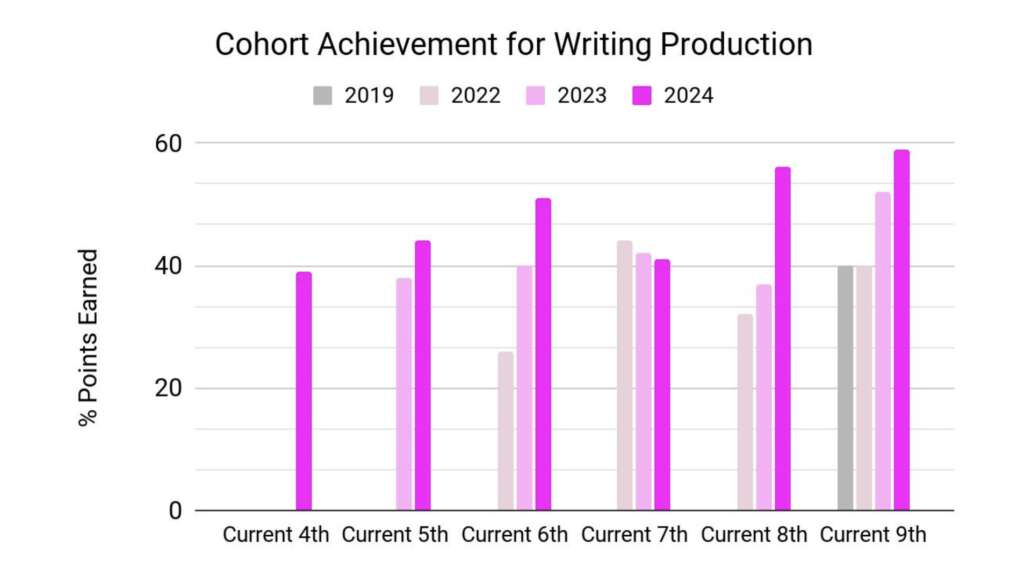Share This Article
On Monday November 4, Sudbury Public Schools (SPS) leadership presented the results of the Massachusetts Comprehensive Assessment System (MCAS) tests, and provided their analysis of those results.
While the initial presentation focused more heavily on the bright spots in the data, the ensuing discussion with the school committee revealed a more sobering assessment of student achievement on the tests.
The presentation was broken out by test subjects including English Language Arts (ELA), Math, and Science. Presenters repeated a few key points in each section, highlighting that SPS outperformed the averages across the state, that MCAS was just one of many assessments used at SPS, and that most peer districts also saw achievement declines year-over-year.
SPS Assistant Superintendent, Annette Doyle, along with staff, repeatedly emphasized that the district is meeting or exceeding its improvement targets during the presentation.
Throughout the presentation staff emphasized examples of encouraging data points, such as an extremely strong performance by 7th graders on Math.
“Grade 7 is ranked 2nd out of 11 from comparable districts and 3rd of 300 from the state for Percent of Students Meeting or Exceeding Expectations.”
Page 41
For every positive highlight of a sub-group or grade, there seemed to be an equal and opposite datapoint that was cause for concern. For example: 7th grade writing production achievement levels dropped for the second year in a row, even as other grades made gains.

SPS leaders linked the top-line achievement declines to peer districts and statewide trends:
With the exception of Lincoln and Needham, whose achievement level remained the same as 2023, the state and all our comparable districts saw a decrease in overall proficiency in 2024.
While that statement is accurate, it fails to quantify the decrease relative to peer districts. SPS students meeting or exceeding expectations in ELA dropped from 71% in 2023 to 65% in 2024. As committee member Mandy Sim pointed out during discussion, that decline was twice as big as the statewide decline. The decline was also significantly larger than all peer districts that saw declines.

Math and Science test results were more encouraging than ELA, but Math achievement levels declined as well. SPS students meeting or exceeding expectations in Math dropped from 72% to 70%. That was the largest decline of any peer district, and worse than State-level performance averages which held steady year-over-year. Some peer districts made significant gains over 2023 achievement levels, and those that dropped 1% year over year were already hitting achievement levels significantly above SPS. For example, Wellesley dropped from 77% to 76% from 2023 to 2024.

Committee members had several questions and significant concerns after hearing the presentation. Member Karyn Jones opened the discussion by asking Doyle if the district was happy with the results, or concerned. Doyle responded:
They’re reasonable results. Right? Is there anything that we are hugely celebrating? I mean, the seventh grade math scores were pretty awesome to be at the top of the state. But I think we’re looking for greater growth. But our student growth average between the 40 and 60 is the target and we’re right in there. In fact we’re a little higher, we’re at 55 generally, so that’s something to be positive about. But you’ve heard repeatedly certain grade levels that we’re really targeting because we’re seeing, not just this past year but over time, and also calibrated with other assessments we have, that they need more support.
58:00
Vice-Chair Gerson voiced concern that the district has been working on an ELA curriculum update for several years, but achievement scores have been in decline the whole time.
We’ve been talking about a new ELA curriculum for a long time. I’d like a better understanding of… so on one of the slides it mentioned that three years after the ELA steering committee selects a program and then develops an implementation plan, it will be implemented.
1:03:20
Staff clarified that the implementation wouldn’t take another three years, but that there would be various things to work through once a curriculum was selected and implemented. Gerson responded:
For five years I’ve listened about ELA implementation and curriculum changes and I look at this chart and over the five years ELA achievement is declining on these graphs.
Staff noted that MCAS doesn’t assess phonics and decoding, which is where the district had been focused with the curriculum updates so far.
Gerson later asked if, given the number of assessments the district does, there was an assessment for writing skills. She unearthed an unsettling revelation. She was told that the district has no standard, district-wide assessments for writing, and that a consistent rubric was going to be developed at some point in the future.
We do not currently have district-wide benchmark writing assessments. We will be currently starting that with the middle school, starting with a common rubric. That’s where we would start is developing a writing rubric with the expectations.”
1:42:11
As the discussion continued, Doyle was increasingly candid about the need for improvement throughout the district:
“We cannot sugar coat that a 62 proficient and advanced is sufficient. It’s not. We want it to be higher than that. I think we are, as you said Meredith, we have some things in place with tiered level support and tier 2 interventions, interventionists, and our summer programming and all those things, and is that meeting what we need? Is our guaranteed viable curriculum sufficient? Which is why we are looking at our ELA.”
1:21:00
Member Mary Stephens drilled into some of the subgroups and grade level trends, raising concerns about English learner achievement.
“There’s a report on the subgroup-based accountability for English learners. On that, under achievement for english language art achievement they got zero out of four points, math achievement zero out of four points, and chronic absenteeism zero out of four. So, just thinking about the accountability and what supports we’re making sure to give the English learners. Obviously that’s concerning data.”
1:46:30
Doyle shared the concerns with Stephens and said the subgroup was a priority, but couldn’t go into details about specific students.
Members, including Vice-Chair Gerson, thanked Doyle for her candor at the end of the discussion. Yet it was unclear if the MCAS results would lead to specific corrective actions across the district. The presentation mentioned initiatives that were already underway, but no significant new initiatives and no acceleration of those plans.

There was discussion that the Superintendent would be addressing any additional actions the district might take by way of the fiscal year 2026 budget-building process in the next two months. However, the FY26 budget would begin in the summer of 2025, and it would fund any net-new initiatives in the 2025-2026 school year, not the current school year.
Superintendent Brad Crozier was almost entirely silent during the MCAS conversation, and a later agenda item to discuss the FY26 budget building process didn’t reveal much about how these MCAS results may impact his budget priorities in the future.
Interested readers who want to follow the budget building process can find a full school committee meeting schedule here. The MCAS report is here.

